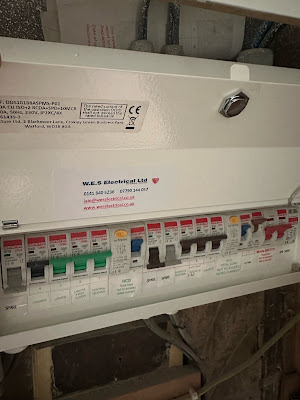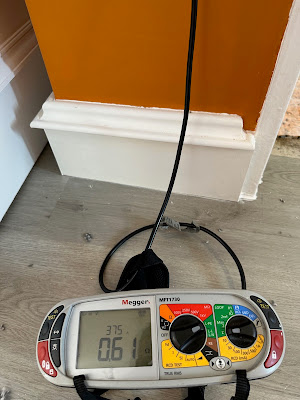Ensuring Electrical Safety in Glasgow: Emergency Electricians, Fishy Smells, New Boards, and 18th Edition Installations
Electrical safety is paramount, especially in a bustling city like Glasgow. This blog explores the critical roles of emergency electricians, the significance of identifying fishy smells, the importance of installing new electrical boards, and ensuring compliance with the latest standards, such as the 18th Edition of the IET Wiring Regulations. Understanding these aspects is essential for maintaining safety in both residential and commercial properties in Glasgow. EICR Cert Glasgow
The Vital Role of Emergency Electricians in Glasgow
Electrical emergencies can strike at any moment, posing significant risks to both properties and their occupants. In Glasgow, emergency electricians are the unsung heroes who respond swiftly to these urgent situations, providing the expertise needed to mitigate hazards and restore normalcy. These professionals are trained to handle a variety of emergencies, including power outages, electrical fires, exposed wiring, and malfunctioning appliances.
Key Responsibilities of Glasgow's Emergency Electricians
- 24/7 Availability: Glasgow’s emergency electricians are on call round-the-clock, ensuring that help is always available when needed most.
- Rapid Response: They prioritize swift responses to minimize damage and reduce the risk of injury or further complications.
- Diagnosis and Repair: These electricians quickly diagnose the problem and implement effective solutions, whether it's a short circuit, faulty wiring, or a blown fuse.
- Safety Assurance: They ensure that the electrical system is safe before leaving the premises, conducting thorough checks and tests to prevent future emergencies.
Identifying Fishy Smells: A Sign of Electrical Danger
One of the most alarming signs of an electrical problem is a fishy smell emanating from outlets, switches, or electrical appliances. In Glasgow’s damp climate, this odor is often indicative of overheating plastic components or wiring insulation, which can lead to serious hazards if left unaddressed.
Common Causes of Fishy Smells
- Overloaded Circuits: Excessive electrical loads on a single circuit can cause wires to overheat, melting the plastic insulation and emitting a fishy odor.
- Faulty Wiring: Poorly installed or deteriorating wiring can lead to overheating and produce the same distinctive smell.
- Aging Appliances: Old or defective appliances can overheat, causing the internal plastic components to melt and release a fishy odor.
- Loose Connections: Loose electrical connections can generate heat, damaging the insulation and creating a fishy smell.
What to Do If You Detect a Fishy Smell
If you notice a fishy smell in your home or business premises in Glasgow, it's crucial to act quickly:
- Turn Off the Power: Immediately switch off the power to the affected area to prevent further overheating.
- Call an Emergency Electrician: Contact a qualified emergency electrician in Glasgow to inspect the problem and make the necessary repairs.
- Do Not Use Affected Outlets or Appliances: Avoid using any electrical outlets or appliances that emit the smell until they have been checked and repaired by a professional.
The Importance of Installing New Electrical Boards
In Glasgow, many properties, especially older ones, may still be equipped with outdated electrical boards that are not designed to handle modern electrical demands. Upgrading to a new electrical board is essential for safety, efficiency, and compliance with current standards.
Benefits of Installing New Electrical Boards
- Enhanced Safety: Modern electrical boards come with advanced safety features such as circuit breakers and residual current devices (RCDs), which provide better protection against electrical faults and shocks.
- Improved Capacity: New boards are designed to handle higher electrical loads, reducing the risk of overloaded circuits and potential hazards.
- Compliance with Standards: Installing a new board ensures that your property meets the latest electrical regulations, including the 18th Edition of the IET Wiring Regulations.
Compliance with the 18th Edition Installations
The 18th Edition of the IET Wiring Regulations, also known as BS 7671, sets the standard for electrical installations in the UK, including Glasgow. Compliance with these regulations is crucial for ensuring the safety and reliability of electrical systems.
Key Aspects of the 18th Edition Regulations
- Protection Against Electric Shock: The 18th Edition emphasizes enhanced protection against electric shock, requiring the installation of RCDs in various scenarios.
- Fire Safety: The regulations include provisions for improving fire safety, such as ensuring proper installation and maintenance of fire detection systems.
- Energy Efficiency: The 18th Edition promotes energy efficiency in electrical installations, encouraging the use of energy-saving devices and practices.
- Inspection and Testing: Regular inspection and testing of electrical systems are mandated to ensure ongoing compliance and safety.
Ensuring Compliance in Glasgow
For property owners and businesses in Glasgow, adhering to the 18th Edition regulations is not just about legal compliance; it's about safeguarding lives and property. Here’s how to ensure compliance:
- Hire Qualified Electricians: Always employ certified electricians who are well-versed in the 18th Edition regulations for any installation or repair work.
- Regular Inspections: Schedule regular inspections of your electrical systems to identify and address any potential issues.
- Upgrade Outdated Systems: If your property has an old electrical system, consider upgrading to meet current standards and improve safety.
Conclusion
In Glasgow, ensuring electrical safety involves the crucial roles of emergency electricians, the timely identification of fishy smells, the installation of new electrical boards, and strict adherence to the 18th Edition of the IET Wiring Regulations. By understanding these aspects and taking proactive measures, property owners can protect their investments, safeguard their occupants, and comply with the latest safety standards.
Electrical issues should never be taken lightly, and having a reliable emergency electrician on hand can make all the difference in preventing accidents and ensuring a swift resolution to any electrical emergency. Stay vigilant, prioritize safety, and ensure that your electrical systems are up to date and compliant with the latest regulations.








